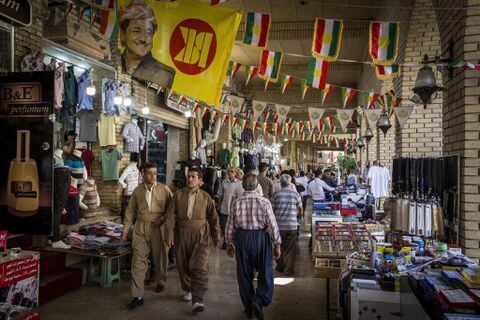Threatening Kurdistan
"The threats don't work against Kurds, and it's much better to engage in dialogue with us now."
"Baghdad and Erbil still need to cooperate against ISIS and the humanitarian crisis in Iraq."
"All we've done is hold a referendum. We have not unilaterally declared independence."
Bayan Sami Abdul Rahman, Washington representative, Kurdistan Regional Government
 |
Patrons
peruse the grand bazaar the Kurdistan region’s Irbil on Sept. 30. Kurds
voted for independence weeks ago, but some elements have impeded the
area’s quest for autonomy.
IVOR PRICKETT/NYT
|
Kurdish leaders in the Kurdistan Regional Government had good enough reason to believe that Washington -- despite its ongoing warning to President Masoud Barzani that the time is not right, that Kurdistan would do better to await another opportunity once the current prevailing atmosphere of conflict and uncertainty is past, to engage in their movement toward sovereignty, abandoning the autonomy that Iraq agreed upon, post-Saddam Hussein's reign of terror, once it carried out its plebiscite and the voters gave ample proof of the people's will -- would support it.
When would an appropriate time to declare Kurdistan's intention to finally become fully independent as a functioning state? Simply by continuing to pursue the status quo, surrendering its full sovereignty to Baghdad and the whims of whoever was placed in the top echelons of executive government would merely prolong the dissatisfaction of millions of people whose ethnic roots long predated those of the Arab tribes ensconced on heritage geography of the Kurds. Without doubt President Barzani might have felt he must lead his people to strike while their iron was still hot.
Waiting until such time as the Islamic State of Iraq and the Levant was fully routed, their caliphate geography a phantom of failure, would simply go on to 'normalize' Kurdistan as an ongoing autonomous region subservient to an Arab political culture that had historically persecuted the Kurds. That four countries claimed land traditional and by heritage the Kurds' throughout history vastly contributes to the emphatic rage of denial by Turkey, Iran, Iraq and Syria.
While Syria's President Bashar al-Assad mounts his ongoing campaign against his majority Sunni citizens by slaughtering hundreds of thousands of civil dissidents he terms 'terrorists', he has the eager assistance of Iran, Lebanon (through the Iranian militia proxy Hezbollah), Turkey and Russia whose interests in a deep-sea port and land base in Syria leads it to airborne military support of the regime enabling Assad to continue his atrocities against his own citizens.
But the overtures to Iraq's parliamentarians by Kurdistan's government to come together at a negotiating table in a civilized manner to discuss the means by which each would be satisfied by an amicable (albeit unwillingly grudging Iraq) to accept Kurdistan's sovereignty is considered beyond the pale, an assault and horrible affront against Arab dominance in the region. Iran has closed the land border with the Iraqi Kurdish region while threatening flights and accusing President Barzani of links to the Israeli Mossad.
Turkey is threatening to close off the Kirkuk oil spigot delivery system despite Russia's massive investment in Kurdistan's oil and gas output and despite Russian President Vladimir Putin's overtures toward reasonableness. Equable reasonableness is the furthest civil attribute that Recep Tayyip Erdogan could conceivably muster on any occasion for any reason that he feels threatens his own Caliphate. The malice that he evinces toward Kurds, not only those within Turkey, but in Syria and Iraq is incalculable.
It is time for the United States administration to recognize its indebtedness to an ally, the only one it could depend upon to rally to the enormous task of challenging and ousting the Islamic State from Iraq. It has been the Kurdish Peshmerga who have performed this task, not the Iraqi military whose courage has been demonstrated to be wanting; they had the U.S.-supplied weapons and rolling stock to effect a winning conflict with ISIL, and melted away in confused panic, leaving the weaponry to benefit Islamic State.
Peshmerga forces led the battles against ISIL with antiquated, inadequate weapons, awaiting the transfer of U.S.- and other NATO-allied nations providing war machinery and updated weapons to the Peshmerga through the government of Iraq; somehow those weapons failed to filter through to the only forces that required their immediate delivery. So, why should the Kurds continue to place any trust in Iraq, a nation whose leaders are more comfortable penalizing the Kurds for not being Arabs than cooperating with them?
It is past time for the Trump administration to threaten to cut off military and economic aid to Iraq and Turkey for their reactions to Kurdish aspirations. The Kurds have been loyal and trustworthy allies to the American war against Islamic State. By taking drastic steps to cut off international access and constrict the economy of the Kurdish region, Iran, Iraq and Turkey are busy with their intention of starving Kurdistan of its due in financial health in line with their plan to punish it for dreaming of nationhood.
If they see fit to threaten war against Kurdistan, the United States has the moral obligation to quietly, diplomatically, inform the threateners that they too will come under threat.
 |
| Iraq Vice President Ayad Allawi says there could be a "violent conflict" over the Kurdish-administered city of Kirkuk if talks over Kurdish independence are left unresolved. The National |
Labels: Conflict, Independence, Iran, Iraq, Kurdistan, Syria, Turkey, United States
0 Comments:
Post a Comment
<< Home